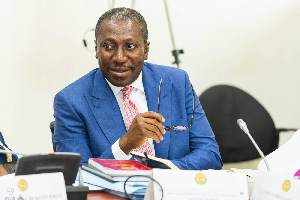TRADITIONAL boundaries and chieftaincy jurisdictions are adversely affecting efforts by the Electoral Commission to demarcate electoral boundaries and create new constituencies.
Some traditional rulers are resisting the electoral redemarcation with the fear that they will lose territory to other chiefs.
The chairman of the Electoral Commission, Dr Kwadwo Afari Gyan, expressed the commission's frustration at a forum on "Legal and institutional framework for District level elections, at Bolgatanga at the weekend. He noted that "sometimes we want to draw an electoral boundary but a chief will not allow us to do so with the claim that he would lose such a portion of land," the EC chairman noted.
The forum, organised by the EC and the Ministry of Local Government and Rural Development, was to determine the appropriate sizes of the districts and discuss whether it should be made partisan. According to Dr Afari-Gyan, in the past, the only criterion in the demarcation of electoral boundaries was population density.
The EC chairman urged the participants to dispassionately digest the issues of the partisan and non-partisan nature of the district assemblies, the appointment or election of District Chief Executives (DCEs), low voter turnout at the district level and unit committee elections as well as other related matters, and come out with concrete suggestions.
Mr Obeng Busia, Special Assistant to the Minister of Local Government and Rural Development, in his contribution, noted that since the assemblies operate like companies in which the government continues to inject money by way of the Common Fund, then the government has every right to protect its interest by ensuring that its appointees serve on the assemblies. On the issue of the appointment or election of the DCE, while some of the participants favoured the former, others felt the DCEs should be elected.
On the low voter turn out, the participants observed that, some of the voters become frustrated when electoral materials are delayed and, therefore, decide to return to their homes or businesses instead of waiting to cast their votes. Some of the contributors, were not happy with the way the one-third government appointees are selected, claiming that instead of the idea being primarily to make up for the shortfalls of the elected members in terms of expertise, the appointing authorities favour party members.
Some of the participants also suggested a reduction in the number of the unit committee members since in some areas they cannot even find the required number.
General News of Monday, 21 October 2002
Source:
Chiefs Thwart Electoral Commission Moves
Entertainment











